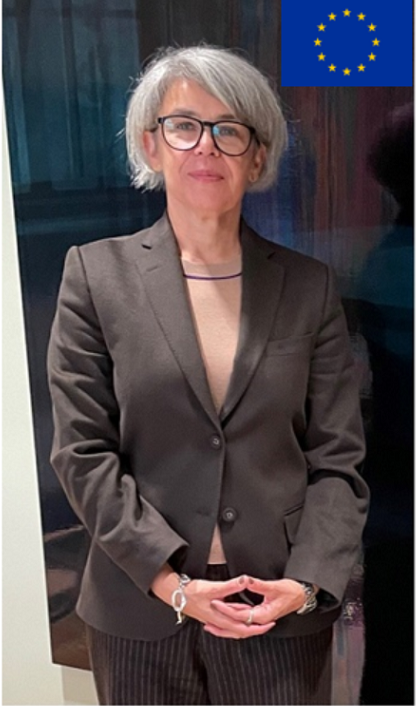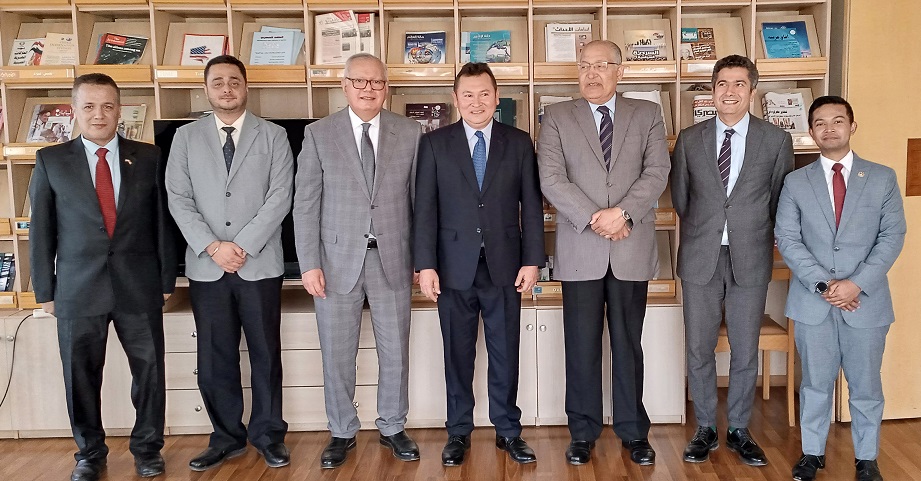On November 30, 2022, ECFA hosted the Ambassador of the Federal Republic of Germany to Cairo, Frank Hartmann, to talk about Egypt-Germany relations, means to enhance them, his country’s vision of the situation in the Middle East and the world, especially the Ukrainian crisis, the current dispute between Russia and the West, and the chances of finding a settlement for it. The meeting was opened by Ambassador Dr. Ezzat Saad, ECFA Director, moderated by Ambassador Mohamed El-Orabi, former Minister of Foreign Affairs, and attended by many ECFA members.
Ambassador Ezzat Saad briefed the guest on ECFA, its activities, and its partnerships inside and outside Egypt, indicating that it is an independent civil society organization. On his part, the guest expressed his gratitude to the Council for hosting him, stressing his deep belief in the importance of strengthening communication with think tanks and civil society organizations in Egypt, and not only with the concerned official authorities, in order to strengthen ties between Egypt and Germany. He added that the bilateral relations between the two countries are deep and extended, and that 2022 marks the 70th anniversary of the establishment of diplomatic relations between Egypt and Germany in 1952, as well as the 80th anniversary of the tragic Battle of El Alamein, in addition to the 20th anniversary of the establishment of the German University in Egypt. In addition, this year coincides Egypt’s hosting of COP27 summit, which was attended by a number of German ministers and parliamentarians, as well as more than 200 individuals from various German entities.
The guest affirmed the specificity of the cultural aspects in bilateral relations, despite the considerable investments they cost, noting that there are currently about half a million Egyptians who speak German, and that the German University in Egypt graduated more students than any similar educational institution at the world level, which makes it a distinct and unrivaled cultural weight for Germany outside Europe.
The guest also mentioned that there are Egyptian partnerships with prominent German companies in many fields and projects, most notably the “Siemens” company, with which Egypt signed in May 2022 the largest deal in its history, to build a new high-speed railway network, with a length of 2000 km, at a cost of more than 8 billion Euros, in addition to the cooperation that already exists in the fields of energy and infrastructure, as in the “Benban” solar energy mega-project, which contributed to strengthening the position of the Egyptian state to be an energy hub, self-sufficient in electricity, and even exporting it to neighboring countries and regions, such as Saudi Arabia and Jordan, and later Europe. In addition to the new cooperation in the field of green hydrogen, according to the MOU that was signed last July, during President El-Sisi’s visit to Germany.
Regarding the Russia-Ukraine war, the guest indicated that Europe did not believe the possibility of war until it occurred, stressing the difficulty of predicting Putin’s behavior. He added that Russia did not achieve its desired goals in Ukraine. However, the repercussions that resulted from the war since its inception are very grave, whether in supply chains, energy, food, financial markets… etc., indicating that his country was determined to diversify its sources of oil and gas to provide its energy resources, instead of its huge reliance previously on Russia (about 55%), by resorting to Qatar, Norway, Algeria and others, and even allocated about 200 billion euros in compensation to industries and individuals inside the country, with the likelihood of an increase in prices in the future, which cannot be avoided. However, the current government formation in Germany makes it difficult to strike a balance in the decisions that can be taken on issues of climate change and reliance on traditional energy sources, as a result of the involvement of the Green Party, which enjoys a significant presence within the government, including the Minister of Foreign Affairs, which strongly defends environmental issues.
As for the Middle East, the guest affirmed his country’s full support for the two-state solution, and its support for the Egyptian position on the Palestinian cause, adding that Germany is trying to bring this solution back to the negotiating table again, despite the difficulty it faces in light of the return of Benjamin Netanyahu at the head of the Israeli government again, including far-right religious parties. On the other hand, Germany sought to find a solution to the Libyan crisis by holding the two Berlin conferences, stressing his country’s full support for various endeavors that would put an end the crisis in Libya. Some ECFA members raised the German position, and the European one in general, regarding the Palestinian cause, proposing that Berlin, and the rest of the European countries that did not recognize the State of Palestine, to recognize it, and explicitly reject the Israeli occupation of the Palestinian territories, similar to the outright European rejection of any Russian occupation of the Ukrainian territories. In this context, the guest stressed that the Palestinian-Israeli conflict is the central and very sensitive issue of the Middle East, noting that his country, as well as the European Union, have repeatedly demanded the necessity of implementing the 1967 borders, and condemned the Israeli settlement expansion operations in the occupied territories, and they did not recognize Jerusalem as the capital of Israel, unlike the United States, while the German embassy is still in Tel Aviv. In the same context, he pointed out that the radical and extremist organizations in the Palestinian territories make it difficult to resume the negotiation process between the two sides. The ambassador also noted that the Palestinian file is the subject of sharp internal division in Germany, and that there are already voices calling for adopting a stronger stance towards Israel.






